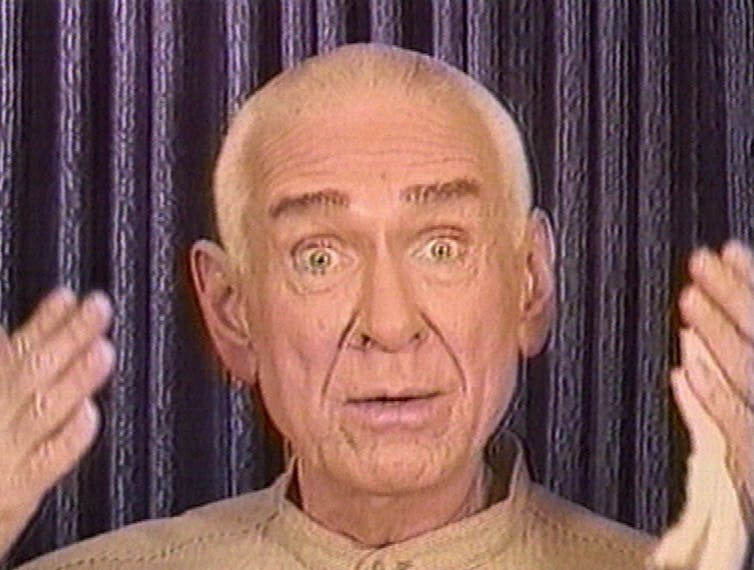Heaven’s Gate – also known as the “UFO cult” – burst into American consciousness on March 26, 1997 when law enforcement discovered 39 decomposing bodies in a San Diego, California mansion.
Each detail that emerged from the scene stunned a rapt public: Adherents had committed suicide in waves on March 22 and 23, ingesting a lethal mix of barbiturates and alcohol; they lay under purple shrouds, with five-dollar bills and rolls of quarters in their pockets; all wore simple dark uniforms and Nike tennis shoes.
Bizarre as these details may seem, if you actually look at the group’s beliefs and history, Heaven’s Gate has far more in common with American culture than you might expect.
In my book on Heaven’s Gate, I argue that the group drew from broad trends in American culture – religiosity, apocalyptic thinking and an interest in fusing science and religion.
But one theme has become even more evident since I wrote the book. The group’s embrace of conspiratorial thinking reflects a culture of conspiracy that has long existed in the margins of society – and has re-emerged at the center of American life.
Christian, New Age origins
At the time of the suicides, Heaven’s Gate had been in existence for over two decades.
It was founded in 1972 when two Texans, Bonnie Lu Nettles and Marshall Herff Applewhite, bonded over shared interests in alternative spiritual exploration, astrology and biblical prophecy. They came to believe that the Bible foretold an extraterrestrial rapture wherein some individuals would be saved from life on this planet and journey to what they called the “Next Level,” a physical realm in outer space where they would live as an immortal, perfected species of space aliens. They gained their first significant attention and converts in 1975 among alternative spiritual seekers in California and Oregon.

Nettles and Applewhite drew from Christian sources, particularly prophetic and apocalyptic material. They were also inspired by the New Age movement, which emphasized meditation, diet and the channeling of spiritual beings. Like many religious people, members of Heaven’s Gate sought salvation from what they considered a corrupt world.
After Nettles died of cancer in 1985, the group’s adherents increasingly rejected their earlier belief in what they called biological metamorphosis, wherein their human bodies would chemically transform into extraterrestrial forms. Instead, they now envisioned abandoning their human bodies on Earth and transferring their consciousnesses – through (unspecified) technological-spiritual means – into new extraterrestrial “Next Level bodies.” (This is roughly analogous to reincarnation.)
Eventually, some members came to believe that they actually were space aliens – that they’d taken on human forms to learn about life on our planet – though this belief appears to have not been universally shared.
The paranoid style of American religion
It may come as a surprise that, until the suicides, Heaven’s Gate attracted little outside attention.
They didn’t face government persecution, angry ex-members or professional anti-cultists eager to destroy them – all of which dogged other new and alternative religions like the Peoples Temple (the group behind the Jonestown massacre) and the Branch Davidians (the targets of the Waco siege).
So what drove Heaven’s Gate to consider collective suicide?
In the final years of the group’s existence, members came to believe in an elaborate conspiracy that leading governmental, religious and economic figures had colluded with a group of demonic extraterrestrials called “the Luciferians.” According to Heaven’s Gate members, these evil forces were all working in concert to cover up the existence of UFOs, and specifically a UFO “companion” that trailed the Hale-Bopp comet, which came closest to Earth on March 22, the day the suicides began.

The sort of conspiratorial thinking that Heaven’s Gate adopted was nothing new. Their belief in government conspiracies and UFOs could be traced back to popular responses to the first “flying saucer” sightings and the crash of an unknown object in Roswell, New Mexico, in 1947.
Religious studies scholar Joseph Laycock has written about how some aspects of the emerging UFO subculture blended scientific and supernaturalist theories, bringing together religion and conspiratorial thinking. Likewise, historian David G. Robertson has documented how UFO conspiracy theories eventually merged with New Age religious thinking to create what he calls “UFO millennial conspiracism.” Heaven’s Gate was part of those trends.
While Heaven’s Gate emerged from ufological culture, they also engaged in a long and storied pattern of conspiratorial thinking by American religious and political movements, a relationship historian Richard J. Hofstadter explored in his famous 1964 essay on the “paranoid style of American politics.”
In the 19th century, this relationship was especially pronounced in a strand of American Protestantism that envisioned an array of nefarious agents attempting to wrest American culture from the values – and control – of white, English Protestants. They initially targeted (sometimes violently) Catholic immigrants – who were neither Protestant nor English – and justified their actions with a blend of nativism and conspiratorial thinking.
And it was this sort of conspiratorial thinking that suffused American political movements, whether it was McCarthyism or the anti-Masonic movement. Hofstadter wrote that proponents of such ideas often felt “dispossessed,” that the country had been “taken away from their kind.”
Today, many fear that external agents, from Muslims to illegal immigrants, have eroded core American “Judeo-Christian” values. Perhaps as a result, we’re now witnessing rising nativism, anti-Semitism and Islamophobia.
When conspiracy goes mainstream
Heaven’s Gate also embraced what historian Michael Barkun calls a “culture of conspiracy,” which divides the world between evil forces secretly conspiring among one another, true believers aware of the conspiracies and the mindless masses who operate without awareness of the truth.
While Barkun focuses on the religious and cultural margins, today the same elements are arguably at work in American political discourse, whether it’s talk of secret government wiretaps, a deep state, or cover-ups within the scientific community on topics ranging from vaccines to climate change.
The adherents of Heaven’s Gate wouldn’t probably be drawn to these various political conspiracies, though they shared the belief that powerful forces colluded behind the scenes to hide the truth. In order to support their claims of the existence of extraterrestrials and UFO visitations, they embraced this conspiratorial logic.
In the 90s, people laughed off the conspiracy theories that consumed the group and eventual led them to “opt out” of the planet and commit suicide.
But what happens when political leaders embrace a similar logic?

